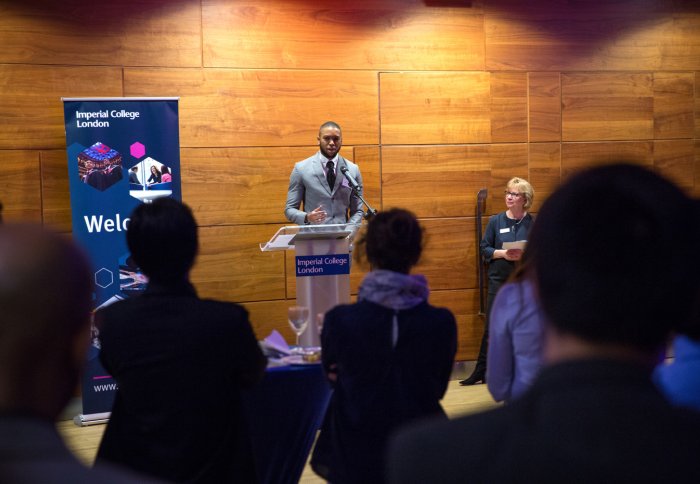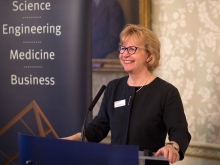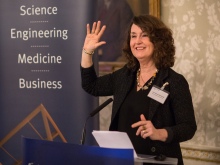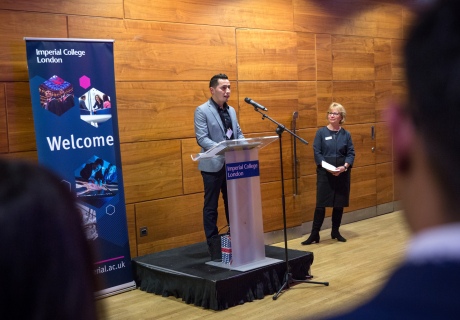International scholars celebrated at diplomatic reception

Gordon Brown from Jamaica addresses his fellow international student scholars
Hundreds of "future leaders" joined diplomats from 30 countries last night for a major event to mark their achievements at Imperial.
Imperial students come from 138 different nations, with many receiving highly competitive scholarships from UK and international funding bodies, as well as their home countries.
 Science attachés and diplomatic leaders from 30 Embassies attended the event, many taking the chance to meet and congratulate students from their own and other countries.
Science attachés and diplomatic leaders from 30 Embassies attended the event, many taking the chance to meet and congratulate students from their own and other countries.
Professor Maggie Dallman, Associate Provost (Academic Partnerships), spoke about the great talent of the scholarship students, and the benefits of working in the UK’s most international university. She said: “In these days with factions in the world that are against globalisation, we’re strengthening our resolve to keep our doors open to the best and brightest talent from around the world.”
 Professor Simone Buitendijk, Vice Provost (Education), spoke about her own “life-changing experience of studying abroad”, moving from the Netherlands to the United States for four years, and the way that international study challenges people “to look critically at what you are used to – outside your comfort zone – and change your thinking in profound ways.”
Professor Simone Buitendijk, Vice Provost (Education), spoke about her own “life-changing experience of studying abroad”, moving from the Netherlands to the United States for four years, and the way that international study challenges people “to look critically at what you are used to – outside your comfort zone – and change your thinking in profound ways.”
She added that “the students who come from other countries are not just students but teachers to their fellow students,” citing her favourite tweet: “Universities have a unique possibility to change the world: we are training the next generation of global decision makers and leaders.”
Future leaders
At the event, Professor Dallman addressed 170 international scholars: “You are recognised as future leaders who will make a difference to society – so no pressure!”
Let’s think globally and let’s try to solve global problems
– Boris Ochoa Tocachi
President's Scholar
She introduced three international scholars who gave impassioned speeches about their studies and ambitions: Gordon Brown, a Commonwealth Scholar from Jamaica studying for an MSc in Environmental Engineering; Amanda Kahunzire, a Chevening Scholar from Uganda working on an MSc in Sustainable Energy Futures; and Boris Ochoa Tocachi, an Imperial President’s Scholar from Ecuador, undertaking a PhD in Civil Engineering.
Gordon said: “There is so much on offer at this institution, so it is extremely hard to pinpoint any singular best experience. I have an agglomeration of quality experiences that will stick with me for life, like learning about a variety of different cultures, for example learning how to say ‘Happy New Year!’ in Chinese (Xinnian kuaile); Gleaning valuable knowledge from in-house and visiting lecturers who are at the forefront of expertise within their fields, be it academic or industrial. Or just the simple fact of being located in an area rich with science and culture within which I can freely indulge.”
Amanda said “The past few months here have been really great and there’s so much to love about Imperial; from the diversity of people, the quality of teaching and the wholesomeness of the student experience.”

Boris Ochoa Tocachi
Boris spoke of his “great honour to be part of Imperial College, a University that has seen inspirational and influential minds in its classrooms and offices,” using his speech to “talk for the people that are not here and don’t have a voice. We have to think more outwardly… in a world where over a billion people lack access to fresh water; 1 in 5 people in developing regions still live on less than $1.25 a day; and, every 20 seconds, a child dies as a result of poor sanitation.”
He said: “If we pride ourselves to be international scholars, let’s think globally and let’s try to solve global problems. Let’s work for the countries where we come from, and for countries that need us and our skills the most. Let’s embrace the goals of sustainable development for all, and let’s engage other people in this venture.”
Article text (excluding photos or graphics) © Imperial College London.
Photos and graphics subject to third party copyright used with permission or © Imperial College London.
Reporter
Thomas Angus [Photographer]
Communications Division
Andrew Scheuber
Communications Division